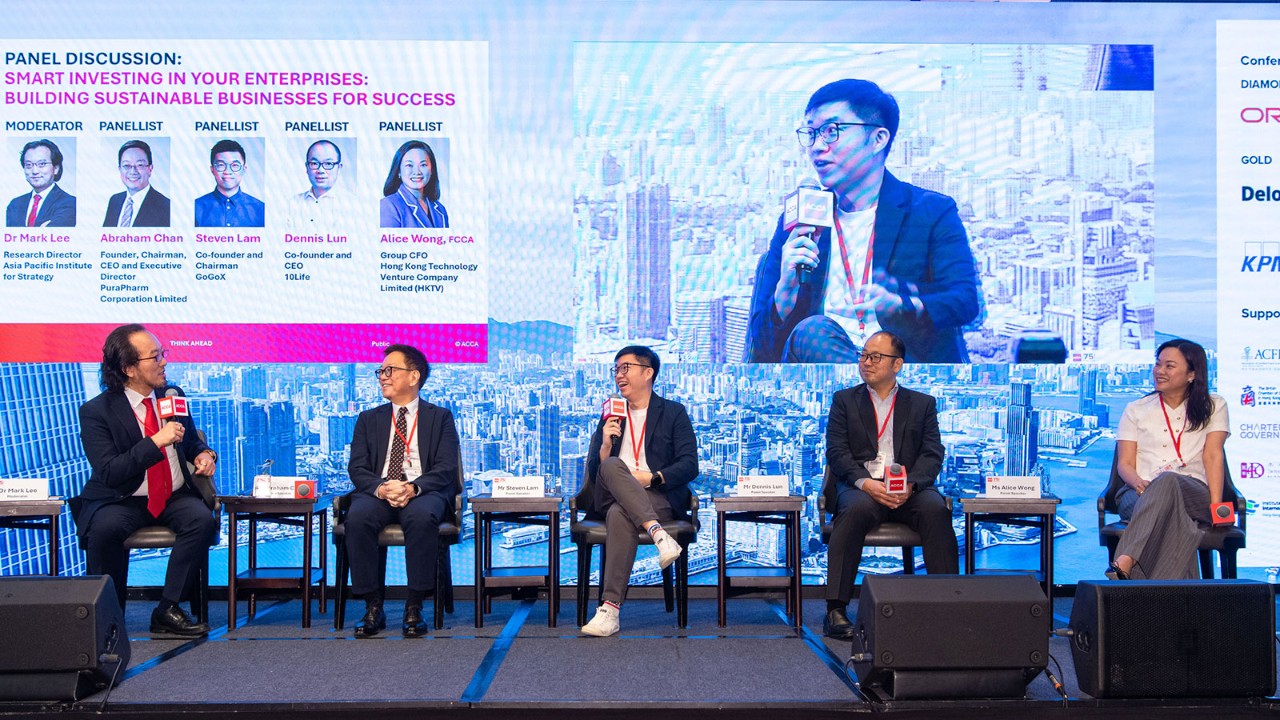
In an era where economic volatility meets rapid technological advancement, businesses need to recalibrate traditional investment strategies to achieve sustainable growth. This new reality took centre stage at the ACCA Hong Kong Annual Conference 2025, where industry leaders gathered to discuss the shift towards smart enterprise investment.
‘This environment calls for strategic shifts in how businesses position themselves, deploy their talent and adjust their investment portfolios,’ said Mark Lee, research director at Asia Pacific Institute for Strategy, moderating a panel discussion on ‘Smart investing in your enterprises: Building sustainable businesses for success’.
Healthcare adapts
Among the sectors navigating market pressures is healthcare. Abraham Chan, founder, chairman, CEO and executive director of PuraPharm Corporation, said that new hospital and drug regulations are compelling companies to adopt more agile business models.
‘With Chinese medicine prices falling from around HK$100 to HK$40, we are looking to shift our focus away from the public sector,’ Chan said. ‘Our strategy now is to expand into B2B2C and B2C markets through establishing our own clinics and developing a franchise network.’
‘We’ve invested in in-house data mining and big data analytics’

Technology and data analytics have become key differentiators. PuraPharm has developed proprietary software that provides prescription and clinic management services to around 900 hospital and clinic clients. ‘We’ve invested in in-house analysts to handle data mining and big data analytics,’ Chan said. ‘Our analysis has evolved from basic symptom tracking to understanding diagnostic patterns and patient demographics.’
The investment has yielded useful market insights in customer demographics. ‘There’s a significant increase in young patients aged 25 to 45 seeking traditional Chinese medicine practitioners, followed by people over 60,’ Chan said. ‘Our mission is to shift public perception. We want people to see Chinese medicine not just as a treatment option, but as part of a holistic healthcare lifestyle.’
Logistics solutions
The logistics sector is also transforming. Steven Lam, co-founder and chairman of GoGoX, highlighted the structural challenges facing Hong Kong-based enterprises. ‘While our revenue continues to grow, Hong Kong’s traditional role as a re-export hub is diminishing, with declining domestic consumption and port activity.’
GoGoX’s response shows how enterprises can leverage regional opportunities to overcome local constraints. ‘We have expanded our product and engineering teams to Taipei and Vietnam, and recently opened an office in Kuala Lumpur,’ Lam explained, addressing what he described as a ‘systemic issue’ in Hong Kong’s technology talent shortage.
Since its foundation in 2013, GoGoX has evolved from a van-hailing service to a comprehensive logistics solutions provider. The company has enhanced its market position by expanding into B2B delivery services and innovating – for example, one of its solutions allows companies to manage all their staff’s delivery orders in one centralised system.
Sustainable growth
The evolution of startup funding dynamics and business sustainability requirements was another key theme of the panel. Dennis Lun, co-founder and CEO of 10Life, noted a significant shift in investor priorities in recent years. ‘In the past, investors and family offices were quite generous with funding, but now everyone’s holding their cards closer to their chest.’
This new reality has compelled startups to adopt more rigorous growth strategies. ‘Previously, investors focused mainly on compelling ideas and growth trajectories, often without scrutinising the bottom line,’ Lun said. ‘Now, they seek startups with a clear business model capable of both capturing market growth and sustaining basic operations like payroll.’ This shift, he emphasised, requires companies to ‘achieve a profitable business model before pursuing aggressive revenue growth’.
‘Our users recognised the advantages of digital insurance purchasing’
Highlighting opportunities, Lun pointed to the insurance sector’s countercyclical nature during market uncertainties. ‘Last year, life insurance sales hit record numbers, and Covid accelerated the shift from offline to online purchases. Crucially, this shift proved enduring, as our users recognised the clear advantages of digital insurance purchasing over traditional offline models; our platform sales sustained growth.’
However, Lun stressed that succeeding in this evolving marketplace demands greater operational resilience. ‘Today’s successful companies need the fortitude to weather challenges like Covid-19 and trade wars while maintaining sustainable long-term growth. With AI’s rapid development, 10Life achieves this balance by leveraging scalability and efficiency gains from implementing AI solutions across its value chain and simultaneously delivering a superior customer experience.’
Retail plunge
Despite some macroeconomic parameters showing an improvement trend for Hong Kong’s overall economy, the retail sector faces significant headwinds, according to Alice Wong FCCA, group CFO and company secretary of Hong Kong Technology Venture.
According to Hong Kong Census and Statistics Department data, total retail sales value fell by 7.3% in 2024 compared with 2023. The downward trend has continued into 2025, with preliminary data showing a 5.6% decline in total retail sales during the first four months compared with the same period in 2024. Online retail performed slightly better due to the structural change in consumer behaviour in the past few years, showing only a 2.2% decline in the first four months of 2025.
According to Wong, technology tops the list of critical challenges that threaten retailers’ long-term survival. ‘Hong Kong faces a severe shortage of technical talent in big data analytics, AI and machine learning, etc,’ she explained. To close the gap, her company has actively recruited from mainland China, which has ‘brought fresh perspectives and creativity that complement our local workforce’.
‘Hong Kong’s demographics have changed dramatically’
Changing demographics push companies to reinvent their strategies. ‘Hong Kong’s demographics have changed dramatically over the past eight to 10 years. There has been an influx of mainland Chinese and migrant workers while some Hong Kong residents have emigrated,’ Wong noted. ‘The surge in overseas travel and mainland shopping is also putting pressure on Hong Kong’s retail sector.’
To serve the evolving market better, her company is committed to using technology to enhance its services – for example, by expanding product varieties, including cross-district delivery on wet market produce – and continuing to build new digital features, including live-streaming and predictive analytics.
Hong Kong’s retail sector must innovate and evolve to maintain its competitive edge, said Wong. ‘Our ultimate objective,’ she emphasised, ‘is to reinvigorate local consumption in Hong Kong through innovating and enhancing our product offerings.’
More information
Register to access the on-demand ACCA Hong Kong Annual Conference 2025
Read our articles from the conference, ‘Making your mark‘ and ‘Investment strategy reset‘

